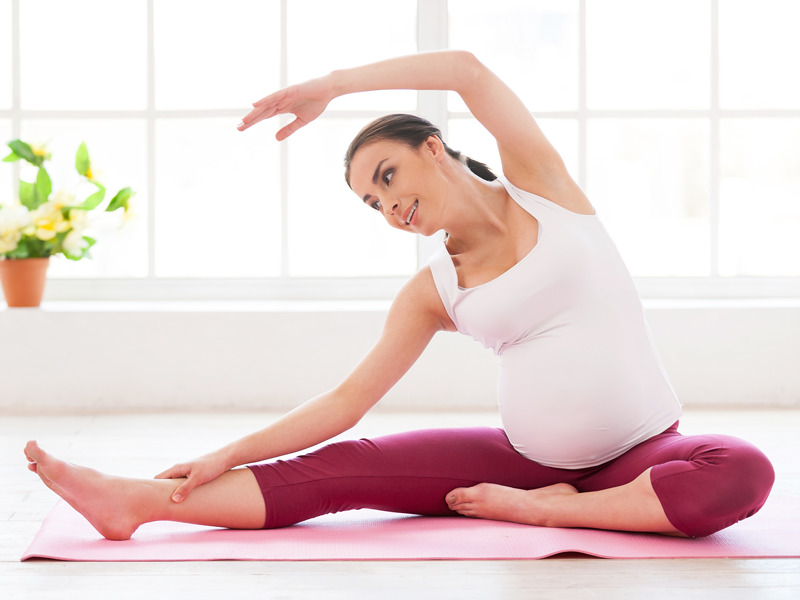It’s perfectly safe and good for the health of both you and your baby to exercise during pregnancy. But it’s important to choose the right types of activity, as the team from Bupa explains here.
What are the benefits of exercise during pregnancy?
Regular exercise can help to reduce tiredness and improve your sleep, improve your mood and wellbeing, and help to prevent health problems related to pregnancy such as gestational diabetes, high blood pressure and back pain.
What exercises are best to do during pregnancy?
Try to do a mixture of aerobic exercises, such as brisk walking or swimming, and strengthening exercises during pregnancy. Strength training involves moving your muscles against a resistance, such as free weights or your own body weight. Speak to a physiotherapist or gym instructor about the correct techniques to use.
You could also try yoga or Pilates classes aimed specifically for pregnant women, or let your instructor know that you’re pregnant if you go to a general class.
Pelvic floor exercises may help strengthen muscles that will be stretched during pregnancy and childbirth.
What exercise can I do in each trimester?
Pregnancy affects every woman differently, so there are no hard and fast rules for exercising. You might need to adapt to the different stages of pregnancy. For example, the first trimester can be challenging for some mums-to-be because of morning sickness and feeling tired. Similarly, in the third trimester, you’ll be carrying considerably more weight and it can be awkward to exercise with your bump.
If you’re unsure about what exercise to do, your midwife, physiotherapist or GP can give you advice.
Are there any risks to exercising during pregnancy?
If your regular routine involves lots of high-intensity exercise, tone things down until after your pregnancy to be safe. Avoid activities like horse riding, cycling and ice skating after your first trimester because of the risk of falling or losing your balance.
When you’re pregnant, your body temperature may increase more than usual when you exercise; so, avoid hot or humid environments, and drink enough water.
After you reach 12 weeks, try not to do exercises that involve lying on your back, as pressure from your baby can reduce how much blood gets back to your heart, thereby causing low blood pressure. Finally, ligaments and tendons tend to soften and become more elastic during pregnancy, increasing the risk of injury. So, warm up and cool down properly, and don’t making sudden changes of direction when exercising.
When should I stop exercising?
There are certain warning signs that you shouldn’t ignore. If you develop any of the following symptoms, get in touch with your midwife or GP: feeling dizzy or faint, headache, difficulty breathing, chest pain, pain and swelling in your calf, bleeding or fluid coming from your vagina, painful contractions, or your baby not moving as much as usual.
How soon can I exercise after giving birth?
This will depend on how things went for you. If you had a healthy pregnancy and no problems giving birth, it’s fine to do gentle exercise after just a few days. Walking is a great way to start; gradually build up to the level of exercise you used to do. Pilates can be useful for maintaining core muscle strength and working your pelvic floor muscles.
The key thing is not to try to do too much too soon – listen to your body. And if you had a caesarean delivery, it’s best to wait until your six-week check with your GP before getting back to anything strenuous. You can still go for walks and do pelvic floor exercises during this time.
This article was brought to you by Bupa Global.
bupaglobal.com | 2531 8562 | globalplanhk@bupa.com
Disclaimer: This article was designed and produced by Bupa Global by searching internal and external data and information for information provision and reference purposes only. Any views or information mentioned in this article/webpage are based on general situations. Readers shouldn’t regard them as medical advice or recommendations. Before making any decisions about the theme of this article, you are recommended to seek independent advice from suitable professionals (doctors, nutritionists, etc.). It is clearly stated that Bupa Global will not bear any responsibilities for others’ usage or interpretation of the information listed in this article. When preparing and/or updating this article, Bupa Global endeavours to ensure that the content is accurate, complete and updated but will not bear any responsibilities nor make any warranty or guarantee for the accuracy, completeness and timeliness of the information or for any claims and/or losses caused thereby.
See more in our Mums & Babies section!
How to prep for your big day
Safe and healthy eating during pregnancy
Expat guide to international schools in Hong Kong
Subscribe to Expat Living magazine now so you never miss an issue.






